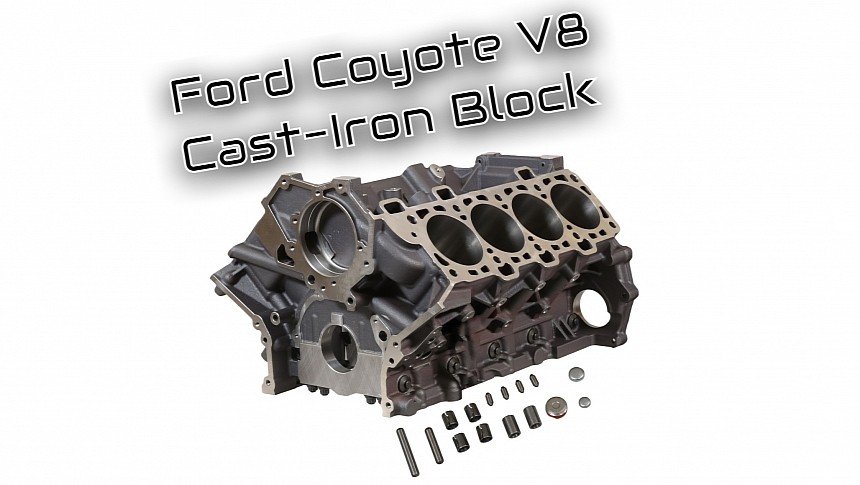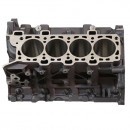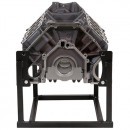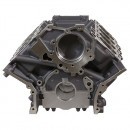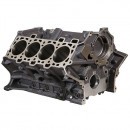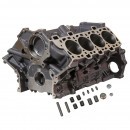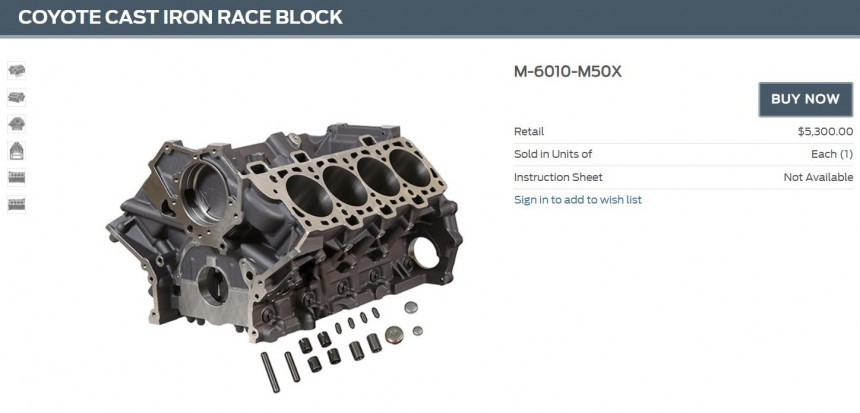In production since 2010 for the 2011 model year (starting with the S197-generation Mustang), the Coyote succeeded the 4.6- and 5.4-liter V8s from the Modular engine family. Over the years, the folks at FoMoCo have improved the breed in many respects.
The 2015 model year marked the introduction of the Gen 2 Coyote, which brought forward a revised valvetrain, piston rods, cylinder heads, an intake manifold with a charge motion control valve designed to adjust the airflow, and higher lift camshafts. Come 2018, the Gen 3 Coyote leveled up to a dual injection system that maximizes fuel efficiency and performance while keeping carbon deposits in check (hence the port fuel injection system).
2024 saw the arrival of the Gen 4 Coyote, which is currently exclusive to the S650-generation Mustang. The Ford Motor Company operated a number of changes over the previous gen, chief among which is the addition of a second throttle body. More air getting into the naturally-aspirated engine results in more power, namely 480 ponies for the GT, 486 with the optional exhaust, and 500 for the Dark Horse.
From 2010 for MY11 to 2023 for MY24, the Ford Motor Company hasn't offered a Coyote with a cast-iron block. That has recently changed, though. M-6010-M50X is how the peeps at Ford Performance designated the cast-iron 'Yote, which carries a sticker price of $5,300 at press time. By comparison, a Gen 3 Coyote production-spec aluminum block retails at $1,350. Also worthy of note, the Godzilla cast-iron block costs $1,145 on Ford Performance's website.
More important still, the cast-iron 'Yote is advertised by Ford Performance as being a race block. In other words, it can handle boost much better than aluminum versions of the Coyote. Cast from class 50 iron, the block is nothing more than a boat anchor unless you spend an extra $1,310 on a forged crankshaft (part number M-6303-M52B). Said crank is a cross-plane design with a 93-mm stroke, namely the crankshaft used for the S550-generation Shelby GT500's 5.2-liter supercharged V8 tower of power.
Turning our attention back to the block, Ford Performance lists a number of compatible heads. Gen 1 and Gen 2 Coyote 5.0-liter cylinder heads open the list, followed by Gen 1, Gen 2, and Gen 3 GT350 5.2-liter cylinder heads. The Maximum bore and stroke are 95 and 99 millimeters, which results in a maximum displacement of 5.6 liters. O-ring head gaskets are required for 95-mm bore applications.
Gifted with billet steel 6-bolt main caps, the cast-iron Coyote utilizes 12-millimeter head bolts. The deck height is listed as 227 millimeters, and Ford Performance further notes a revised deck design for increased strength around the water jackets. The entire package tips the scales at 228 pounds (103 kilograms), whereas the production-spec aluminum block is said to weigh 114 pounds (52 kilograms).
Another interesting piece of information shared on Ford Performance's website is the country of origin. As opposed to Canada for the production block, the cast-iron race block is manufactured in the United States of America. At which plant in the US of A, however, is a bit of a mystery for the time being.
The Windsor Engine Plant in Ontario, where Ford makes the 7.3-liter Godzilla, appears to be the actual place of origin because said plant specializes in cast-iron blocks. The Gen 3 Coyote for the F-150 and Gen 4 Coyote for the Mustang, by comparison, are produced at the Essex Engine Plant in Ontario.
2024 saw the arrival of the Gen 4 Coyote, which is currently exclusive to the S650-generation Mustang. The Ford Motor Company operated a number of changes over the previous gen, chief among which is the addition of a second throttle body. More air getting into the naturally-aspirated engine results in more power, namely 480 ponies for the GT, 486 with the optional exhaust, and 500 for the Dark Horse.
From 2010 for MY11 to 2023 for MY24, the Ford Motor Company hasn't offered a Coyote with a cast-iron block. That has recently changed, though. M-6010-M50X is how the peeps at Ford Performance designated the cast-iron 'Yote, which carries a sticker price of $5,300 at press time. By comparison, a Gen 3 Coyote production-spec aluminum block retails at $1,350. Also worthy of note, the Godzilla cast-iron block costs $1,145 on Ford Performance's website.
More important still, the cast-iron 'Yote is advertised by Ford Performance as being a race block. In other words, it can handle boost much better than aluminum versions of the Coyote. Cast from class 50 iron, the block is nothing more than a boat anchor unless you spend an extra $1,310 on a forged crankshaft (part number M-6303-M52B). Said crank is a cross-plane design with a 93-mm stroke, namely the crankshaft used for the S550-generation Shelby GT500's 5.2-liter supercharged V8 tower of power.
Gifted with billet steel 6-bolt main caps, the cast-iron Coyote utilizes 12-millimeter head bolts. The deck height is listed as 227 millimeters, and Ford Performance further notes a revised deck design for increased strength around the water jackets. The entire package tips the scales at 228 pounds (103 kilograms), whereas the production-spec aluminum block is said to weigh 114 pounds (52 kilograms).
Another interesting piece of information shared on Ford Performance's website is the country of origin. As opposed to Canada for the production block, the cast-iron race block is manufactured in the United States of America. At which plant in the US of A, however, is a bit of a mystery for the time being.
The Windsor Engine Plant in Ontario, where Ford makes the 7.3-liter Godzilla, appears to be the actual place of origin because said plant specializes in cast-iron blocks. The Gen 3 Coyote for the F-150 and Gen 4 Coyote for the Mustang, by comparison, are produced at the Essex Engine Plant in Ontario.
